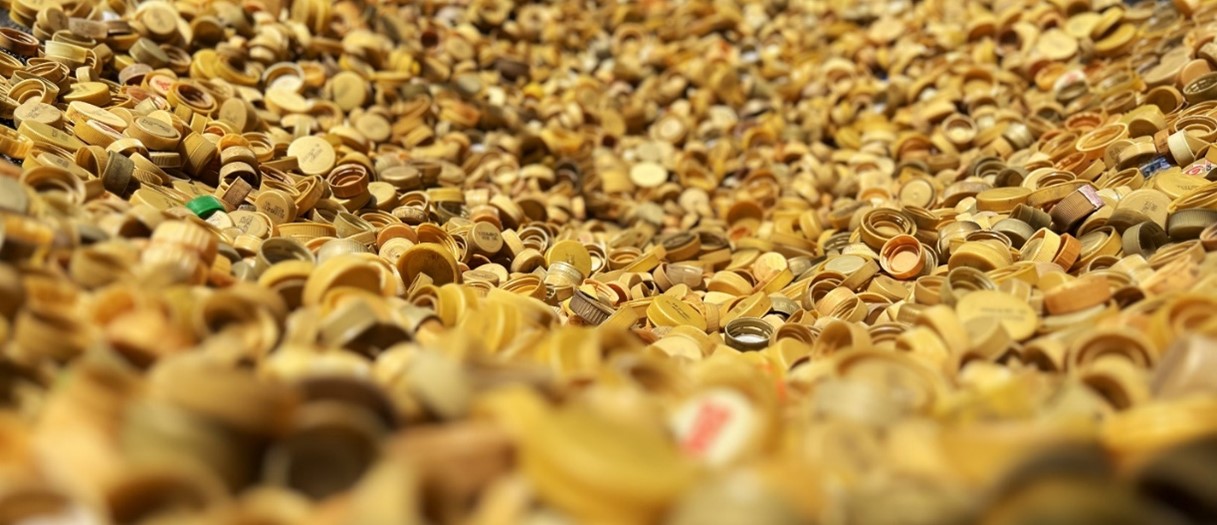

Waste is a design flaw. Turning a blind eye doesn’t make it disappear—it ensures it thrives. Neglecting waste is like sweeping dust under the rug – the more you ignore it, the more it piles up until the problem is impossible to contain.
In a world increasingly driven by metrics and measurable gains, waste is often overlooked because addressing it lacks immediate incentives. Yet waste can mean opportunity, and in many cases, it translates directly into thriving businesses. For instance, the global scrap metal market is valued at a staggering US$ 407 billion, while the recycled polyethylene terephthalate (rPET) market—primarily from bottled plastics—exceeds US$ 10 billion.
This is the case of WeDoo, a circular economy consulting and engineering company based in the paradise island of Bali, Indonesia.
The neglected monster beneath the ocean
Bali, the paradise island, is known for many things – from its harmonious culture and culinary experiences to its vibrant markets and, of course, – its beaches and diving sites.

Manta Ray swims through the obstacles of plastic waste
Amidst the serene beauty of the nutrient-rich blue waters at Nusa Penida – an island just off the coast of Bali – Valerine saw something disturbing during her diving session: plastic waste floating alongside the majestic marine life. This moment not only saddened her but ignited a drive to address the mounting waste problem in Indonesia’s waters. As she watched the fish struggle to swim through the debris, Valerine knew she had to act.
“It was the beginning, and I felt the urge to do something about it. I felt very sorry for what humans have done and it was like hearing the fishes speaking to me asking what we can do about it,” Valerine passionately shared.
That encounter became the “inception moment” for Valerine Chandrakesuma’s journey to create WeDoo.
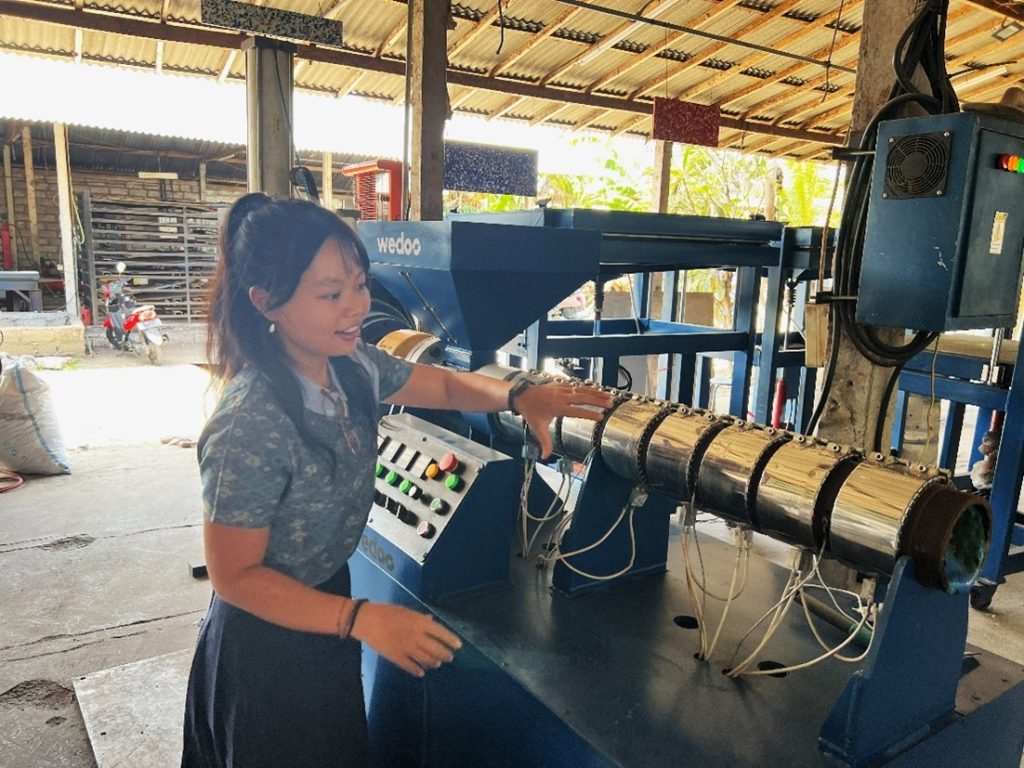 Valerine Chandrakesuma, founder of WeDoo, showcasing her latest plastic extrusion machine
Valerine Chandrakesuma, founder of WeDoo, showcasing her latest plastic extrusion machine
The ground up
Our personal encounter with Valerine took place in October, an ideal time to experience the beauty of Bali where the weather was neither too hot nor bogged down by rain. We visited the WeDoo workshop in Sukawati, a location renowned for its vibrant art market.
The WeDoo workshop exuded simplicity with Valerine and her small team working diligently in a modest facility. She personally oversees operations and handles the mechanical intricacies of the machineries with a hands-on approach that sets her apart – she is no ordinary womanpreneur!
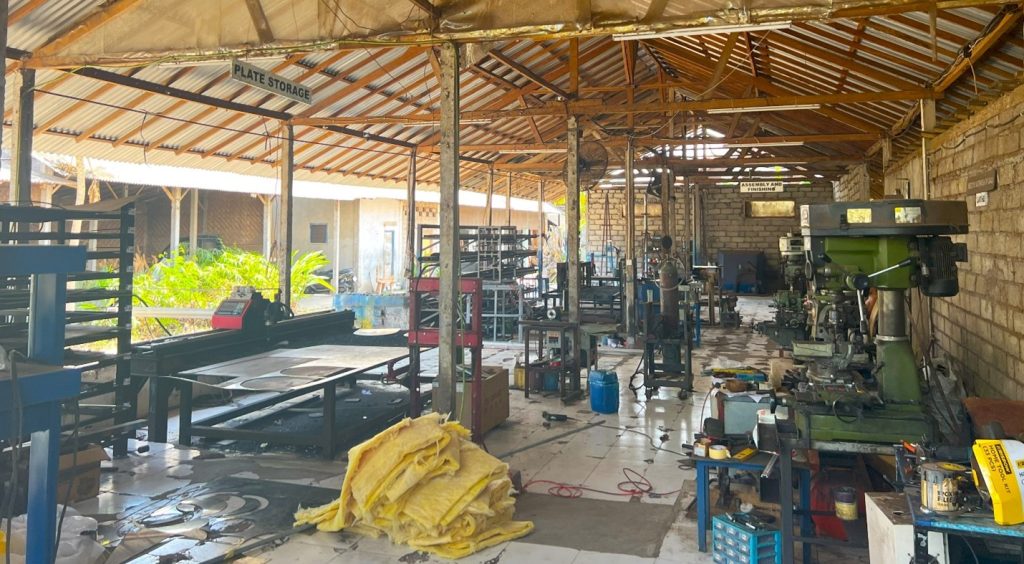 WeDoo’s machine workshop
WeDoo’s machine workshop
We were inspired by Valerine’s warmth, passionate energy and her in-depth knowledge of every piece of machinery in her workshop. This was even more impressive considering that her background is not even in engineering but in architecture.
During her studies at the University of British Columbia, Valerine began experimenting with ways to recycle and reuse materials. Alongside friends, she joined the MELT Collective in Canada in 2018, sourcing basic machines like ovens and shredders from online marketplaces like Craigslist to melt and transform plastic waste. Despite setbacks, including the dissolution of her team due to COVID-19, the dream of bringing these innovations to Indonesia stayed alive.
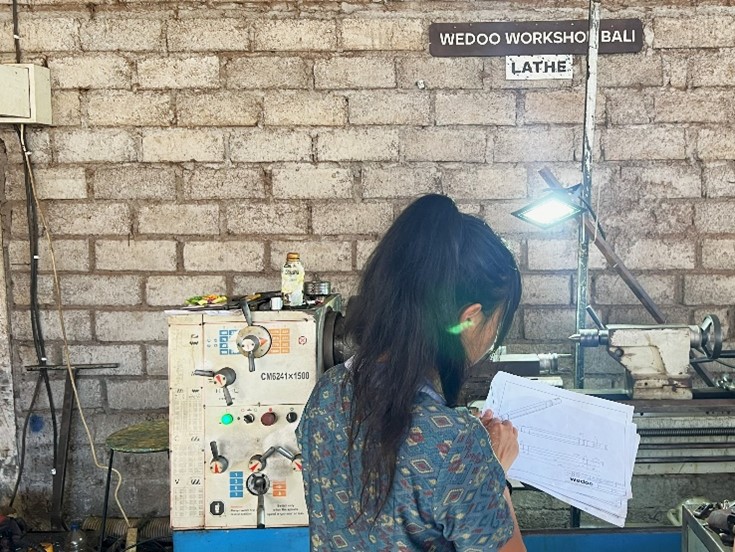
Valerine passionately walked us through her machine blueprints. Admittedly, most of it was beyond our understanding at first, but the drawings had an IKEA-style comprehensibility that gave us a glimmer of hope!
In 2022, as borders reopened, Valerine returned to Bali and partnered with a like-minded individual equally passionate about waste management. Together, they set out to create a company that could empower Indonesian islands to handle their waste sustainably. Although her partner left shortly after, Valerine carried forward the mission, establishing WeDoo officially in January 2023.
Turning waste into value
WeDoo’s core philosophy centers on the power of “small and many” solutions. Indonesia’s vast archipelago, with over 17,000 islands, presents unique challenges for waste management due to its decentralized geography.
Rather than relying on centralized waste processing, WeDoo focuses on building localized recycling systems. Their machines—designed to shred, compress, and melt —enable communities to process organic, plastic, and even glass waste on-site, transforming it into valuable resources. This approach minimizes environmental impact, reduces transportation costs, and generates economic value at the local level.
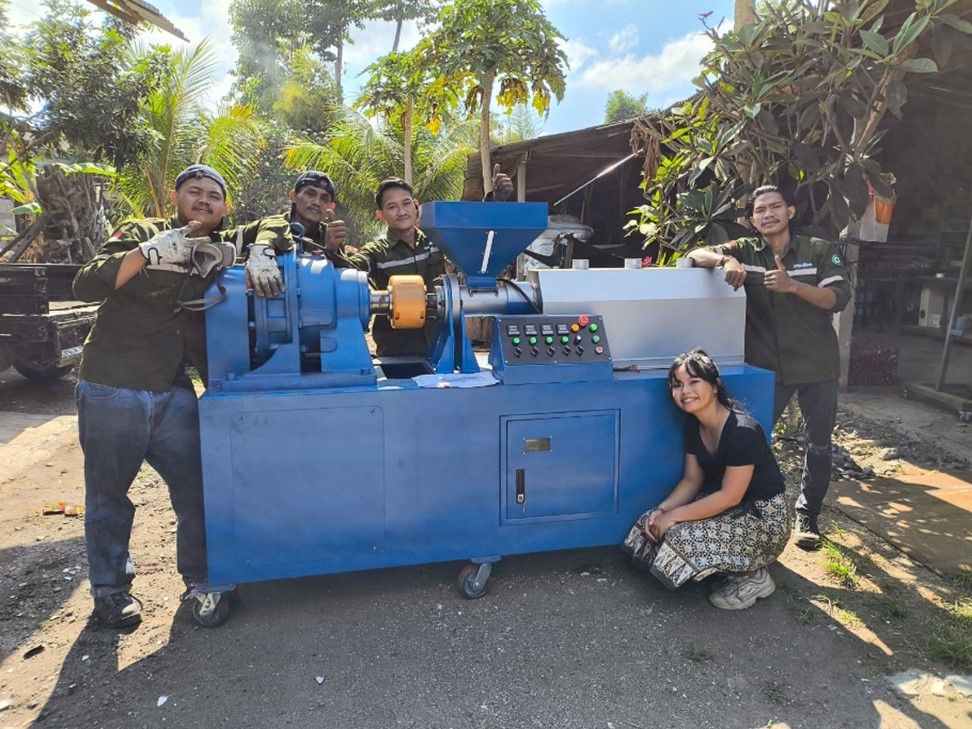
Valerine and the Wedoo Team with one of their latest machines – the “Extruder Pro Max”, designed to make construction materials out of waste
One of WeDoo’s key innovations is its baler machines, which compact large amounts of plastic into stackable cubes, making it easier and more cost-effective to transport and resell.
These machines, along with shredders, CNC cutters, and other custom-made equipment, enable clients like Sungai Watch, an environmental organization with a mission to stop plastic from going into the ocean, to manage plastic waste sustainably across Bali and Java. For small businesses and local NGOs, WeDoo’s machines provide a much-needed toolset to address waste management efficiently.
A vision for every island
Valerine envisions a future where each island in Indonesia has the tools and resources to manage its own waste in a sustainable way. WeDoo has designed over 50 types of machines, from large bailers for major operations to smaller, low-cost units that can be used in community centers and schools. Their clients range from hospitality groups, like Potato Head to social initiatives such as Yayasan Kaki Kita, which creates affordable prosthetics from recycled plastics.
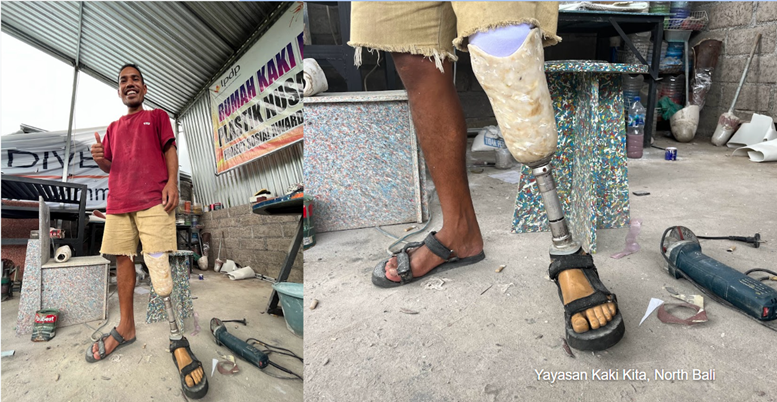
Yayasan Kaki Kita produces prosthetic legs from recycled plastic bottle caps to empower those who lost their limbs from diabetes or disabilities
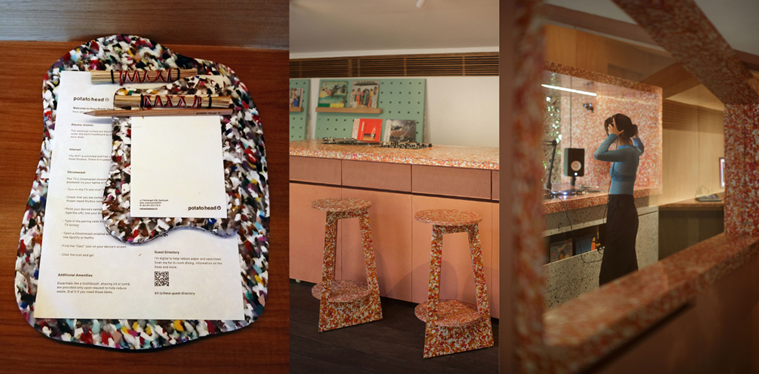
Potato Head recycling their plastic waste using WeDoo’s machines into furniture for their hotels
In each collaboration, WeDoo tailors its approach, recognizing the unique waste profiles and community needs across Indonesia. For example, the company recently built a conveyor system for Besakih Temple, Bali’s largest temple, to manage offerings waste—primarily unopened candies—which can now be sorted and composted.
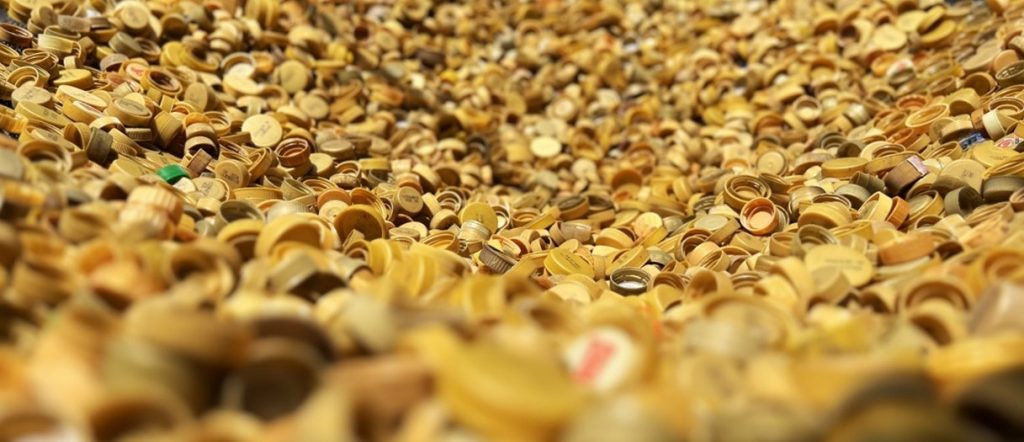
WeDoo machine upcycles bottle caps – silent culprits often thrown away because they are difficult to recycle
The Balance Between Profit and Purpose
As a for-profit entity, WeDoo recognizes the need to balance financial sustainability with its environmental mission. This approach ensures that the company can continue to provide durable, impactful solutions without compromising on quality. By charging affordable rates and keeping certain machines at a lower price for rural communities, WeDoo makes its services accessible to those who need them most.
WeDoo has big plans for the future. With 20 machine categories and a steady demand from clients, the company is already outgrowing its current workspace and is looking to scale up operations. Educational programs, community outreach, and collaborations with NGOs are all part of their ongoing efforts to instill a culture of recycling and sustainability across Indonesia.
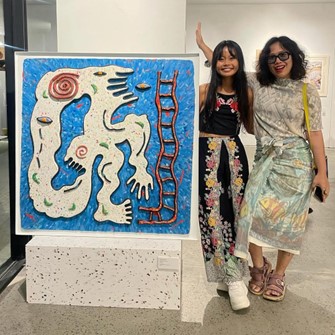 Waste made into beautiful art – Wedoo’s collaboration with artist Aharimu
Waste made into beautiful art – Wedoo’s collaboration with artist Aharimu
An inspiration
What makes WeDoo truly special is Valerine’s relentless passion. From bottle caps to blueprints, her vision transforms challenges into opportunities and waste into a powerful testament to the potential of human ingenuity. Here at Heyokha, we find it essential to highlight and support ventures like WeDoo. Valerine and her team’s commitment to sustainability not only benefits the environment but also empowers communities and transforms industries. These stories remind us that lasting change requires both innovation and dedication, and that the future belongs to those who invest in building a better world today.
Tara Mulia and Nicholas
Admin heyokha
Share
Waste is a design flaw. Turning a blind eye doesn’t make it disappear—it ensures it thrives. Neglecting waste is like sweeping dust under the rug – the more you ignore it, the more it piles up until the problem is impossible to contain.
In a world increasingly driven by metrics and measurable gains, waste is often overlooked because addressing it lacks immediate incentives. Yet waste can mean opportunity, and in many cases, it translates directly into thriving businesses. For instance, the global scrap metal market is valued at a staggering US$ 407 billion, while the recycled polyethylene terephthalate (rPET) market—primarily from bottled plastics—exceeds US$ 10 billion.
This is the case of WeDoo, a circular economy consulting and engineering company based in the paradise island of Bali, Indonesia.
The neglected monster beneath the ocean
Bali, the paradise island, is known for many things – from its harmonious culture and culinary experiences to its vibrant markets and, of course, – its beaches and diving sites.

Manta Ray swims through the obstacles of plastic waste
Amidst the serene beauty of the nutrient-rich blue waters at Nusa Penida – an island just off the coast of Bali – Valerine saw something disturbing during her diving session: plastic waste floating alongside the majestic marine life. This moment not only saddened her but ignited a drive to address the mounting waste problem in Indonesia’s waters. As she watched the fish struggle to swim through the debris, Valerine knew she had to act.
“It was the beginning, and I felt the urge to do something about it. I felt very sorry for what humans have done and it was like hearing the fishes speaking to me asking what we can do about it,” Valerine passionately shared.
That encounter became the “inception moment” for Valerine Chandrakesuma’s journey to create WeDoo.
 Valerine Chandrakesuma, founder of WeDoo, showcasing her latest plastic extrusion machine
Valerine Chandrakesuma, founder of WeDoo, showcasing her latest plastic extrusion machine
The ground up
Our personal encounter with Valerine took place in October, an ideal time to experience the beauty of Bali where the weather was neither too hot nor bogged down by rain. We visited the WeDoo workshop in Sukawati, a location renowned for its vibrant art market.
The WeDoo workshop exuded simplicity with Valerine and her small team working diligently in a modest facility. She personally oversees operations and handles the mechanical intricacies of the machineries with a hands-on approach that sets her apart – she is no ordinary womanpreneur!
 WeDoo’s machine workshop
WeDoo’s machine workshop
We were inspired by Valerine’s warmth, passionate energy and her in-depth knowledge of every piece of machinery in her workshop. This was even more impressive considering that her background is not even in engineering but in architecture.
During her studies at the University of British Columbia, Valerine began experimenting with ways to recycle and reuse materials. Alongside friends, she joined the MELT Collective in Canada in 2018, sourcing basic machines like ovens and shredders from online marketplaces like Craigslist to melt and transform plastic waste. Despite setbacks, including the dissolution of her team due to COVID-19, the dream of bringing these innovations to Indonesia stayed alive.

Valerine passionately walked us through her machine blueprints. Admittedly, most of it was beyond our understanding at first, but the drawings had an IKEA-style comprehensibility that gave us a glimmer of hope!
In 2022, as borders reopened, Valerine returned to Bali and partnered with a like-minded individual equally passionate about waste management. Together, they set out to create a company that could empower Indonesian islands to handle their waste sustainably. Although her partner left shortly after, Valerine carried forward the mission, establishing WeDoo officially in January 2023.
Turning waste into value
WeDoo’s core philosophy centers on the power of “small and many” solutions. Indonesia’s vast archipelago, with over 17,000 islands, presents unique challenges for waste management due to its decentralized geography.
Rather than relying on centralized waste processing, WeDoo focuses on building localized recycling systems. Their machines—designed to shred, compress, and melt —enable communities to process organic, plastic, and even glass waste on-site, transforming it into valuable resources. This approach minimizes environmental impact, reduces transportation costs, and generates economic value at the local level.

Valerine and the Wedoo Team with one of their latest machines – the “Extruder Pro Max”, designed to make construction materials out of waste
One of WeDoo’s key innovations is its baler machines, which compact large amounts of plastic into stackable cubes, making it easier and more cost-effective to transport and resell.
These machines, along with shredders, CNC cutters, and other custom-made equipment, enable clients like Sungai Watch, an environmental organization with a mission to stop plastic from going into the ocean, to manage plastic waste sustainably across Bali and Java. For small businesses and local NGOs, WeDoo’s machines provide a much-needed toolset to address waste management efficiently.
A vision for every island
Valerine envisions a future where each island in Indonesia has the tools and resources to manage its own waste in a sustainable way. WeDoo has designed over 50 types of machines, from large bailers for major operations to smaller, low-cost units that can be used in community centers and schools. Their clients range from hospitality groups, like Potato Head to social initiatives such as Yayasan Kaki Kita, which creates affordable prosthetics from recycled plastics.

Yayasan Kaki Kita produces prosthetic legs from recycled plastic bottle caps to empower those who lost their limbs from diabetes or disabilities

Potato Head recycling their plastic waste using WeDoo’s machines into furniture for their hotels
In each collaboration, WeDoo tailors its approach, recognizing the unique waste profiles and community needs across Indonesia. For example, the company recently built a conveyor system for Besakih Temple, Bali’s largest temple, to manage offerings waste—primarily unopened candies—which can now be sorted and composted.

WeDoo machine upcycles bottle caps – silent culprits often thrown away because they are difficult to recycle
The Balance Between Profit and Purpose
As a for-profit entity, WeDoo recognizes the need to balance financial sustainability with its environmental mission. This approach ensures that the company can continue to provide durable, impactful solutions without compromising on quality. By charging affordable rates and keeping certain machines at a lower price for rural communities, WeDoo makes its services accessible to those who need them most.
WeDoo has big plans for the future. With 20 machine categories and a steady demand from clients, the company is already outgrowing its current workspace and is looking to scale up operations. Educational programs, community outreach, and collaborations with NGOs are all part of their ongoing efforts to instill a culture of recycling and sustainability across Indonesia.
 Waste made into beautiful art – Wedoo’s collaboration with artist Aharimu
Waste made into beautiful art – Wedoo’s collaboration with artist Aharimu
An inspiration
What makes WeDoo truly special is Valerine’s relentless passion. From bottle caps to blueprints, her vision transforms challenges into opportunities and waste into a powerful testament to the potential of human ingenuity. Here at Heyokha, we find it essential to highlight and support ventures like WeDoo. Valerine and her team’s commitment to sustainability not only benefits the environment but also empowers communities and transforms industries. These stories remind us that lasting change requires both innovation and dedication, and that the future belongs to those who invest in building a better world today.
Tara Mulia and Nicholas
Admin heyokha
Share






